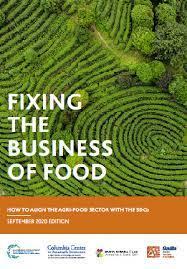
FIXING THE BUSINESS OF FOOD 2020 - BCFN Foundation (barillacfn.com)
Here an article about the report: Barilla Foundation Brings Health and Climate Together in New Double Pyramid | Inter Press Service (ipsnews.net).
What does it mean for a food and agriculture company to be aligned with the Sustainable Development Goals (SDGs)? Despite growing corporate sustainability efforts, the answer to this question remains unclear. Companies, investors, consumers, and citizens continue to face challenges in understanding what it means for a company or an investment to be considered “sustainable” or not. The lack of a rigorous and comprehensive framework through which to assess corporate alignment with the SDGs leaves companies without clear guidance on supporting SDG achievement. This gap also enables companies to downplay some areas of the SDGs when reporting on their sustainability performance.
In 2019, the Fixing the Business of Food Initiative presented a Four Pillar Framework for alignment of the food and agriculture sector with the SDGs. This report presents a deeper iteration of that conceptual framework to guide business alignment with the SDGs and the Paris Climate Agreement (PCA), specifically for companies in the food and agriculture sector. We propose a Four Pillar Framework, which seeks to contribute to corporate SDG alignment by bringing rigor and clarity on the aspects of business activity that affect the SDGs. To understand how the framework might be applied to the food and agriculture sector, the report also elaborates on the key environmental, nutrition, and social & governance topics that companies in the food and agriculture sector need to tackle in order to achieve the SDGs. The report further assesses current sustainability reporting standards, frameworks, and certifications against the Four Pillar Framework and key identified topics, exploring whether available reporting instruments sufficiently support SDG alignment. It concludes by examining how business indicators might be developed under the Framework to support its application, using greenhouse gas (GHGs) emissions as an example, and with some recommendations










Add new comment